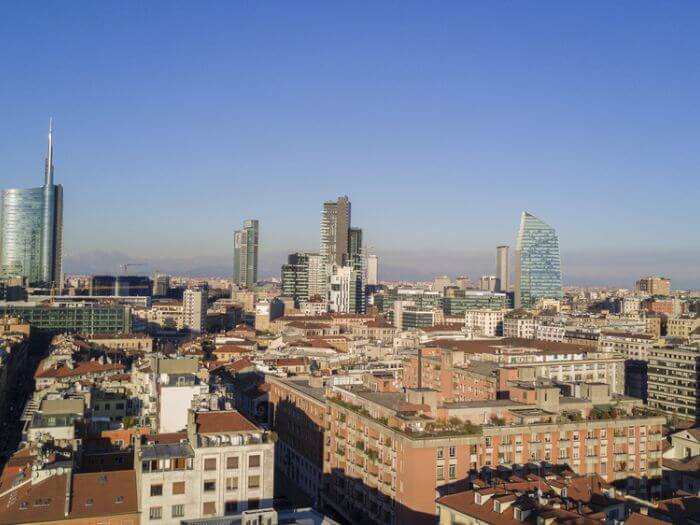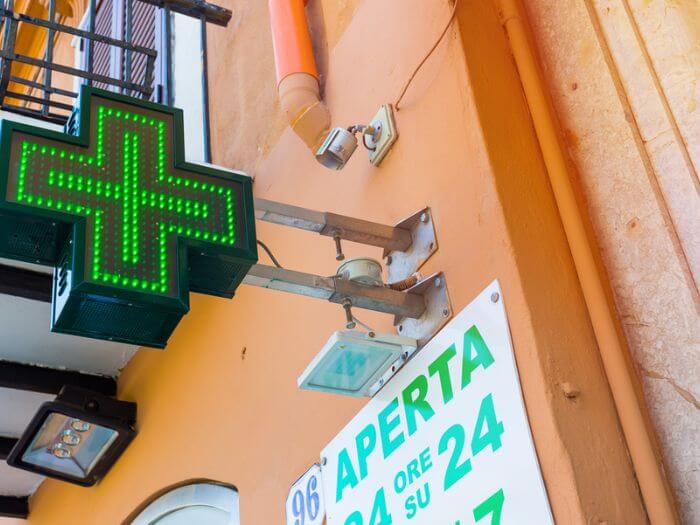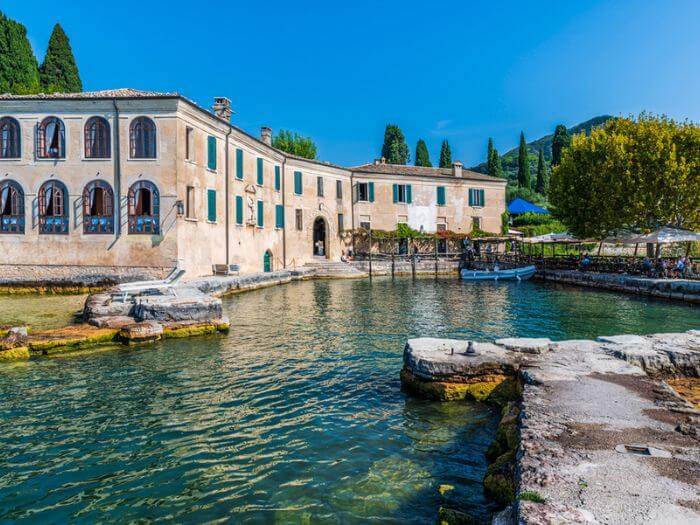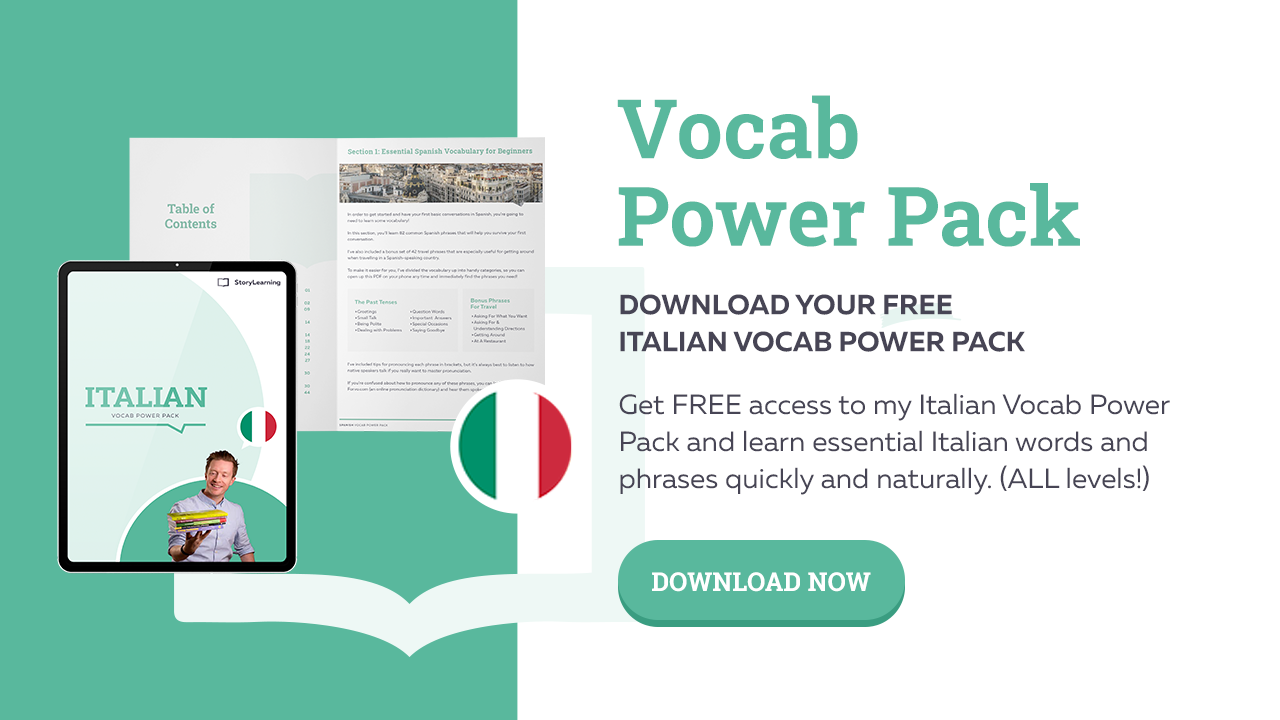When it comes to learning Italian, congratulations, you’ve made it! You can finally get rid of the ‘Beginner’ label, or at least that’s the plan.
Your Italian learning journey likely started with the basics – ciao, grazie, buongiorno.
Now ordering a pizza or asking for directions in Italian comes so easy to you that you start thinking, “Hey, I'm doing pretty good!”
However, when you try to read a classic book in Italian or watch Italian news, you can understand the general setting, but you can’t really grasp what’s going on.
So in this post you'll learn 119 advanced Italian words that will help you express yourself more accurately in Italian and understand native-level content.
Pro Tip
By the way, if you want to start your Italian learning journey fast and have fun while doing it, my top recommendation is Italian Uncovered which teaches you through StoryLearning®.
With Italian Uncovered you’ll use my unique StoryLearning® method to learn Italian naturally through story… not rules. It’s as fun as it is effective.
If you’re ready to start, click here for a 7-day FREE trial.
Table of Contents
Advanced Italian Vocabulary: Why Learn It And What To Learn

At the beginning of your Italian learning journey, you needed to communicate with the limited tools you had.
But now, you also notice that whenever you try to describe something in Italian, bello has become your default adjective. And whenever you want to explain something, you can’t help but use cosa (thing) in every other sentence.
As you progress, the need for speed and efficiency will kick in. Learning the word martello (hammer) instead of referring to it as la cosa che usi per battere le cose (the thing you use to beat stuff) will prove much more time-effective.
While basic vocabulary is crucial for everyday communication, the ability to speak and write with confidence and accuracy in a new language can open doors to new opportunities, both personally and professionally.
When you're trying to communicate something complex or nuanced, the right word can make all the difference.
Advanced Italian vocabulary will allow you to express yourself with greater clarity, accuracy, and subtlety, making your arguments more persuasive and your ideas more compelling.
So to recap:
- Learn basic vocabulary for fluency, immediate needs and light conversations
- Start incorporating advanced vocabulary to really get into the culture and start to enjoy reading Italian books, watching Italian movies and having deep conversations with natives in Italian.
The type of advanced Italian phrases you should start learning depends on your interests and goals for learning the language. Below I’ve included a few suggestions that broadly cover some of the most common categories.
Advanced Italian Vocabulary & Examples For Various Scenarios
Let's dive in and explore 119 advanced Italian words and phrases that will take your Italian language skills to the next level!
To help familiarise you with the advanced Italian vocabulary, you'll follow Tom and Sarah, an English speaking couple in Italy, as they go about their days.
You'll explore some of the contexts where it would be helpful to know various technical and domain specific words.
Vocabulary About The Home
Scenario 1: Renting An Apartment

Tom and Sarah are renting an apartment in Italy and need to talk with the landlord about issues related to their accommodation.
Here's some vocabulary they could use:
- #1 Contratto di affitto (Lease agreement)
- #2 Ristrutturare (To renovate)
- #3 Arredare (To furnish)
- #4 Affittare (To rent)
- #5 Acquistare (To purchase)
- #6 Bolletta (Utility bill)
- #7 Balcone (Balcony)
- #8 Camino (Fireplace)
- #9 Mansarda (Attic
- #10 Spese condominiali (Condominium expenses)
- #11 Deposito di sicurezza (Security deposit)
- #12 Sfratto (Eviction)
- #13 Riparazione (Repair)
Vocabulary About Jobs

Scenario 2: Colloquio Di Lavoro
Tom is applying for a position at an Italian company.
Tom: Buongiorno, ho un appuntamento per il colloquio di lavoro.
Datore di lavoro: Sì, prego si sieda. Mi parli delle sue esperienze lavorative.
Tom: Ho una vasta esperienza nella gestione dei progetti e una profonda conoscenza delle strategie di marketing.
Datore di lavoro: Ottimo. Quale stipendio ti aspetti da questa posizione?
Tom: Apprezzerei un’offerta di stipendio competitiva che tenga conto della mia esperienza.
Tom: Good morning, I have an appointment for the job interview.
Employer: Yes, please have a seat. Tell me about your work experiences.
Tom: I have extensive experience in project management and a strong knowledge of marketing strategies.
Employer: Excellent. What are your salary expectations for this position?
Tom: I’d appreciate a competitive salary offer that takes into account my experience.
Here's that job vocab in a handy list:
- #14 Curriculum (Resume, C.V.)
- #15 Colloquio di lavoro (Job interview)
- #16 Esperienza lavorativa (Work experience)
- #17 Gestione dei progetti (Project management)
- #18 Strategie di marketing (Marketing strategies)
- #19 Competenze (Skills)
- #20 Salario competitivo (Competitive salary)
- #21 Contratto di lavoro (Work contract)
- #22 Promozione (Promotion)
- #23 Riunione di lavoro (Business meeting)
- #24 Assunzione a tempo determinato (Fixed-term employment)
- #25 Formazione professionale (Professional training)
- #26 Fatturazione (Invoicing)
- #27 Affari (Business)
- #28 Tasse (Taxes)
- #29 Imposta sul reddito (Income tax)
- #30 IVA (VAT)
- #31 Consulenza fiscale (Tax consultation)
- #32 Attività commerciale (Business activity)
- #33 Reddito (Income)
Vocabulary About The Law

Scenario 3: Colloquio Con Un Avvocato
Coppia: Buongiorno, abbiamo bisogno di un avvocato per una questione legale.
Avvocato: Certo, di che si tratta?
Coppia: Abbiamo avuto un incidente stradale e vogliamo capire i nostri diritti.
Avvocato: Capisco. Potremmo fare una consulenza legale per valutare la vostra situazione e capire come procedere.
Coppia: Sì, perfetto. Grazie mille.
Couple: Good morning, we need a lawyer for a legal matter.
Lawyer: Of course, what is it about?
Couple: We had a car accident and we want to understand our rights.
Lawyer: I see. We could have a legal consultation to assess your situation and figure out how to proceed.
Couple: Yes, perfect. Thank you very much.
Here's a list of Italian legal lingo:
- #34 Avvocato (Lawyer)
- #35 Consulenza legale (Legal consultation)
- #36 Incidente stradale (Car accident)
- #37 Diritti (Rights)
- #38 Risarcimento danni (Compensation for damages)
- #39 Testimoni (Witnesses)
- #40 Procedura giudiziaria (Legal procedure)
- #41 Contratto (Contract)
- #42 Corte (Court)
Vocabulary About Education

Scenario 4: Education
The couple plans on attending a language school in Italy
Here are some words they could use to talk about this topic:
- #43 Borsa di studio (Scholarship)
- #44 Programma di studi (Study program)
- #45 Corso di laurea (Degree course)
- #46 Istituto tecnico (Technical institute)
- #47 Insegnamento a distanza (Distance learning)
- #48 Tassa universitaria (University fee)
- #49 Esame di ammissione (Entrance exam)
Vocabulary About Health

Scenario 5: Visita Dal Medico
Sarah: Ciao, abbiamo bisogno di fissare un appuntamento dal medico.
Segretaria: Buongiorno, certo! Qual è il motivo della visita?
Sarah: Mio marito ha avuto un incidente e ha bisogno di una radiografia.
Segretaria: Capisco. Possiamo fissare un appuntamento per domani alle 10 del mattino?
Sarah: Sì, perfetto. Grazie mille.
“Sarah: Hello, we need to schedule a doctor's appointment.
Receptionist: Good morning, of course! What is the reason for the visit?
Sarah: My husband had an accident and needs an X-ray.
Receptionist: I see. Can we schedule an appointment for tomorrow at 10 a.m.?
Sarah: Yes, perfect. Thank you very much.”
Here's a list of Italian health vocabulary:
- #50 Appuntamento medico (Medical appointment)
- #51 Radiografia (X-ray)
- #52 Incidente (Accident)
- #53 Esame del sangue (Blood test)
- #54 Prescrizione (Prescription)
- #55 Anamnesi (Medical history)
- #56 Medico (Doctor)
- #57 Infarto (Heart attack)
- #58 Salute (Health)
- #59 Malattia (Illness)
Vocabulary About Politics

Scenario 6: Politics
Our friends (I mean, you've stalked them long enough that a para-social relationship has formed) are attending a political conference in Italy.
Coppia: Ciao, stiamo cercando di capire meglio il sistema politico italiano.
Esperto di politica: Allora, il sistema politico italiano è complesso ma interessante. Avete qualche domanda specifica?
Coppia: Quali sono i partiti politici più importanti e le loro posizioni politiche?
Esperto di politica: Ci sono diversi partiti politici in Italia, dai conservatori ai progressisti. Alcuni dei partiti più importanti sono il Partito Democratico, la Lega Nord, il Movimento 5 Stelle e Forza Italia. Ognuno di questi partiti ha posizioni politiche diverse su questioni come l'immigrazione, l'economia e la sicurezza.
Couple: Hi, we're trying to better understand the Italian political system.
Political expert: Well, the Italian political system is complex but interesting. Do you have any specific questions?
Couple: What are the most important political parties and their political positions?
Political expert: There are several political parties in Italy, from conservatives to progressives. Some of the most important parties are the Democratic Party, the Northern League, the Five Star Movement, and Forza Italia. Each of these parties has different political positions on issues such as immigration, the economy, and security.
Here's the vocabulary you'll need to discuss Italian politics.
- #60 Governo (Government)
- #61 Democrazia (Democracy)
- #62 Sondaggio (Poll)
- #63 Movimento cinque stelle (Five Star Movement)
- #64 Centro-sinistra (Center-left)
- #65 Centro-destra (Center-right)
- #66 Analista politico (Political analyst)
- #67 Ideologia (Ideology)
- #68 Affari esteri (Foreign affairs)
- #69 Sistema politico (Political system)
- #70 Partiti politici (Political parties)
- #71 Elezioni (Elections)
- #72 Campagna elettorale (Election campaign)
- #73 Voto (Vote)
Vocabulary About Culture

Scenario 7: Exploring Cultural Landmarks
The couple is planning to visit cultural sites such as museums, art galleries, and historical landmarks.
Coppia: Siamo interessati a visitare alcuni dei famosi punti di riferimento culturali in Italia. Potresti consigliarcene qualcuno?
Guida turistica italiana: Certamente, alcuni dei luoghi più popolari includono il Colosseo, la Torre di Pisa e i Musei Vaticani.
Coppia: Siamo entusiasti di approfondire la ricca storia culturale dell'Italia.
Couple: We're interested in visiting some of Italy's famous cultural landmarks. Can you recommend any?
Italian tour guide: Certainly, some of the most popular landmarks include the Colosseum, the Tower of Pisa, and the Vatican Museums.
Couple: We're excited to learn more about the rich Italian cultural history.
Here's the advanced Italian vocabulary you'll need to talk about culture:
- #74 Cultura italiana (Italian culture)
- #75 Museo (Museum)
- #76 Galleria d'arte (Art gallery)
- #77 Opera d'arte (Artwork)
- #78 Evento culturale (Cultural event)
- #79 Patrimonio culturale (Cultural heritage)
- #80 Capolavoro (Masterpiece)
- #81 Architettura rinascimentale (Renaissance architecture)
- #82 Arte contemporanea (Contemporary art)
Idiomatic Expressions

Scenario 8: Idioms
Tom and Sarah discover first hand how learning Italian idioms can help you sound more natural when speaking with native speakers.
Here are some Italian idioms for you to add to your speech:
- #83 Fare bella figura (To make a good impression)
- #84 Prendere in giro (To take around in loops = To tease, make fun of)
- #85 Fare quattro chiacchiere (To make four talks = To have a chat)
- #86 Farsi vivo (To alive oneself = To appear or get in touch)
- #87 Dare una mano (To lend a hand = To help)
- #88 Farcela (To make it)
- #89 Avere le mani bucate (To have a hole in one's pocket = To be a spendthrift)
- #90 Fare il diavolo a quattro (To make the devil in four = To raise hell)
- #91 Essere al verde (To be in the green = To be broke)
- #92 Avere la testa tra le nuvole (To have one's head in the clouds = To be absent-minded)
- #93 Prendere un granchio (To catch a crab = To make a mistake)
- #94 Avere il coltello dalla parte del manico (To have the knife on the handle side = To have the upper hand)
- #95 Mettere una pulce nell'orecchio (To put a flea in one's ear = To raise doubts or suspicions)
Advanced Italian Verbs

Scenario 9: Verbs
Here’s another key ingredient that will make a difference in your language learning fluency: advanced Italian verbs.
Here are some advanced Italian verbs:
- #96 Sperimentare (To experiment)
- #97 Intraprendere (To undertake)
- #98 Rinunciare (To renounce)
- #99 Collaborare (To collaborate)
- #100 Prevedere (To predict)
- #101 Confermare (To confirm)
- #102 Costruire (To build)
- #103 Sviluppare (To develop)
- #104 Dimostrare (To demonstrate)
- #105 Condividere (To share)
Scenario 10: Adjectives
And lastly, let's not overlook the powerful impact of adjectives. Mastering advanced Italian adjectives can add a new flavour to what could be an otherwise vague description.
Check out this list of more advanced adjectives:
- #106 Cortese (Polite)
- #107 Maleducato (Rude)
- #108 Prezioso (Valuable, precious)
- #109 Inutile (Useless)
- #110 Innovativo (Innovative)
- #111 Convenzionale (Conventional)
- #112 Saggio (Wise)
- #113 Stolto (Foolish)
- #114 Fastidioso (Annoying)
- #115 Piacevole (Pleasant)
- #116 Avvincente (Captivating)
- #117 Noioso (Boring)
- #118 Scaltro (Sly)
- #119 Ingenuo (Naive)
Remember, it's important to focus on advanced Italian vocabulary that is relevant to your interests and goals. These examples are just a starting point!

When & How To Start Learning Advanced Italian Vocabulary?
Consider this: do you increasingly feel frustrated about not being able to convey your thoughts in Italian because it requires terminology that wasn't covered in your basic/conversational/beginner studies?
That’s it. That frustration is the sign that you’ve overgrown the beginner stage and are ready to take on a new challenge.
Expanding your vocabulary is an essential part of becoming fluent in Italian and will take your language skills to the next level.
Once you have a solid grasp of basic Italian phrases and Italian grammar, you can start gradually incorporating more advanced Italian vocabulary into your studies.
One effective approach to expanding your vocabulary is to read widely in Italian. This is after all the basis of the StoryLearning method. You can read Italian blogs, Italian language books or even better, short stories in Italian.
Ultimately, the key is to find a balance between mastering the basics and challenging yourself with more advanced vocabulary.
But here's the thing. You can't just memorise a list of advanced words and call it a day. You need to actually use those words in context and make them a part of your regular vocabulary.
That means deliberately practising advanced Italian vocabulary whenever you get the chance is imperative. It takes time and effort, but you’ll reap all the rewards!
The Problem With Learning Advanced Italian Vocabulary

Learning Italian vocabulary that's more advanced will be very satisfying since it makes your communication more engaging and impactful.
However, if there is a challenge for this stage of learning, it will be related to the very nature of the words you're trying to learn.
Advanced Italian vocabulary is, in a sense, ‘specialised’ vocabulary that is not used as frequently as basic vocabulary.
That means that the added difficulty will be in retaining these types of words since they are lower-frequency words. After all, how many times could you get away with saying soggezione (awe) or sondaggio (poll) on the same day before people start giving you the side eye?
The trick then would be to pay attention to the advanced vocabulary you normally use in your native language.
Maybe even think back or record a conversation with a friend in your native language and take note of the words you use most frequently.
Another solution is to consider your interests and read or watch content in Italian that is related to that context. Giving you a list of sports related words, for example, would be pointless if you don’t follow any sports.
If you're an athlete though, those would be the perfect type of advanced Italian vocabulary to learn because much of your life would revolve around the subject.
The Secret To Speaking Like A Native With Basic Vocabulary
What if I told you that you could actually level up your Italian without necessarily having to learn 1000s of new specialised words?
‘How,’ you ask?
One of the things that really separates beginner and advanced learners is their mastery of the basics.
In particular, – if you forget everything else in this post – remember this: mastering Italian verb conjugation is one of the fundamental steps to start speaking Italian fluently and with confidence.
After all, no one expects you to know all the vocabulary in the Italian language but mastering core concepts such as how to correctly use and conjugate il passato prossimo (past perfect) or il condizionale (the conditional) is an impressive feat worth celebrating.
So, if you're serious about taking your Italian to the next level, the single most crucial thing you can do is get your verb tenses right.
Advanced Italian Vocabulary FAQ
What is the C1 level of Italian?
C1 in Italian is an advanced proficiency level where you can understand complex texts, express yourself fluently, and use the language effectively in social, academic, or professional settings.
You can grasp implicit meanings and nuances in conversations and written materials.
How can I improve my Italian vocabulary?
To improve your Italian vocabulary, regularly read Italian books, newspapers, or online articles and watch Italian films or TV shows with subtitles.
Use apps like Memrise or Anki for flashcards, keep a vocabulary notebook, and practise speaking with native speakers or language exchange partners.
What is the C2 level in Italian?
C2 is the highest proficiency level in Italian, indicating near-native fluency.
At this level, you can understand virtually everything heard or read, summarise information, and express yourself precisely and effortlessly in any context, including idiomatic and colloquial expressions.
What is the longest word in italiano?
One of the longest words in Italian is precipitevolissimevolmente, meaning “as fast as possible.” It’s rarely used in everyday language but showcases the complexity and playfulness of Italian vocabulary.

The Real Reason To Learn Advanced Italian Vocabulary
Advanced Italian vocabulary will help you communicate better with native speakers and help you understand and enjoy Italian content of all sorts.
However the reason for learning advanced Italian vocabulary goes deeper than that.
Language learners often experience a cultural and social barrier when they start speaking a language they don’t have much familiarity with.
During the early stages, speaking is a compromise between what you want to say, what you know how to say and what you actually convey (and you sometimes have the bad end of that deal).
Conversation might be pleasant and enjoyable once you gain basic fluency, but it might also be shallow and superficial. It can be challenging to express yourself, your views and beliefs only via basic vocabulary.
Ditto for the person you are speaking with, they will likely limit themselves and only use the Italian vocabulary they think you already understand.
The only way to make your personality come through also when speaking is by slowly and steadily incorporating advanced Italian vocabulary that is relevant to your life and interest.
And it's not just about sounding impressive or showing off. It can open doors to new fields of knowledge. Give it enough time and you’ll find it easier to engage in deep and meaningful conversations with natives and communicate on a deeper level with others.
Besides the practical rewards of this effort, you will be enriched by all you learn in the process since you are bound to be exposed to new ideas and perspectives that will expand your horizons and broaden your understanding of the world.
After all:
– attributed to Leo Buscaglia
Ogni volta che impariamo qualcosa di nuovo, noi stessi diventiamo qualcosa di nuovo. (Every time we learn something new, we ourselves become something new.)

Olly Richards
Creator of the StoryLearning® Method
Olly Richards is a renowned polyglot and language learning expert with over 15 years of experience teaching millions through his innovative StoryLearning® method. He is the creator of StoryLearning, one of the world's largest language learning blogs with 500,000+ monthly readers.
Olly has authored 30+ language learning books and courses, including the bestselling "Short Stories" series published by Teach Yourself.
When not developing new teaching methods, Richards practices what he preaches—he speaks 8 languages fluently and continues learning new ones through his own methodology.










































